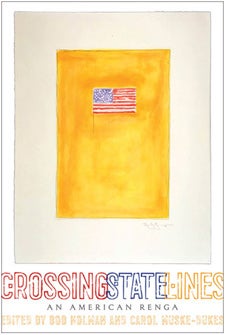A Soul Divided
In an excerpt from her poem “Twin Cities II,” Carol Muske-Dukes writes:
A single
Mind, forever unable to refuse its overstatement: blood
On snow, the gnawed bars of the trap, crack after crack
In the courthouse floor. And one irrefutable truth after another —
Obliterated by the irrefutable dual: City and City and
River and river of this, my Ever-Dividing Reflection.
Muske-Dukes was born in St. Paul, Minn. Across the Mississippi River is Minneapolis, and together they are known as Twin Cities. The poet’s birthplace provides the trope developed throughout her new book of poetry, Twin Cities (Penguin Publishing, 2011).
Her collection of poems in Twin Cities is not to be confused with exploring yin and yang, when contrary forces become interconnected.
“It’s more yin/yin or yang/yang,” Muske-Dukes, professor of English and creative writing in USC Dornsife and California’s poet laureate said. “The idea of the two, the twins, the doubling of the self — the divided soul — two coasts, two minds, two souls. Yet linked.”
Muske-Dukes will read from Twin Cities, her eighth book of poetry, and other work during the Los Angeles Times Festival of Books on Saturday, April 30 at 2:15 p.m. in Harris Hall. Twin Cities — selected as a June pick for Midwest Connection, part of the Midwest Booksellers Association — will be available for purchase at the festival. Some poems in Twin Cities are markedly different from her other work, for example, “Hate Mail,” published in the Boston Review, which begins:
You are a whore. You are an old whore.
Everyone hates you. God hates you.
He pretty much has had it with all women—
The title poem published in The New Yorker and “Boy” published in The Atlantic are closer to her narrative style. So are some of the vivid poems in Twin Cities that evoke memories of her late husband, David Dukes, an actor with a long film career until he died of a heart attack in 2000 while on location shooting the Stephen King mini-series Rose Red.
“The Invention of Your Face,” begins:
I was waiting when you came back from
Argentina—the summer you smuggled
Dulce de leche in your luggage.
The poem later recalls a captivating moment with the couple’s then 6-year-old daughter:
You spooned sweet milk paste from the tin into
Her cereal bowl—then let image after image
Appear for her through a camera lens you made
Of your hands, held like half-opened wings in the air.
“I still cannot write with any distance about David Coleman Dukes, my late husband,” Muske-Dukes said. “But I’m working on a play in which a character similar to him figures — that’s helping.”
At 3:30 p.m. Saturday on the Poetry Stage, Muske-Dukes will host a reading of Crossing State Lines: An American Renga (Farrar, Straus and Giroux, 2011), which she co-edited with Bob Holman. Crossing State Lines will also be available for purchase. Other poets featured in Crossing State Lines will participate, including Dana Goodyear of USC Dornsife’s Master of Professional Writing (MPW) program and David St. John, professor of English.

Crossing State Lines: An American Renga (Farrar, Straus and Giroux, 2011)
In the book, 54 United States poets collaborated on a single poem about America. The practice is known as renga, an ancient Japanese tradition of collaboration poetry in which one poet writes his or her lines then passes it on to the next.
“It’s a phenomenon — gathering energy all its own.” Muske-Dukes said. “It’s just out and I’ve already done an interview — Robert Hass, Lt. Col. Ed Ledford and I — with Morning Edition on NPR, and The Huffington Post has asked Bob Holman and me to write a blog about Crossing for them.”
Poet Robert Pinsky starts the renga on the East Coast and it ends with Hass on the West Coast. In between are poets as diverse as Paul Simon, who included a chord progression in his contribution, to Ledford, who recently returned from Afghanistan, to Rita Dove and Luis J. Rodriguez.
In Crossing State Lines’ introduction, Holman recounts what he calls “an apocryphal event” that led to the unique collaboration. Holman and Muske-Dukes were at the same late night soiree in New York City.
“It was ’round midnight, the conversations had become music, and all of a sudden I found myself dueling with Ms. Muske-Dukes! (Not a place you want to be.)” Holman writes. “I have no idea how this came about, but the gist is simple enough — Carol was going on about Sylvia Plath, a poet whose work I admire, but I unfortunately mentioned that of the confessionalists I’d prefer to go with Anne Sexton. To say hell broke loose is an understatement, and the only conceivable way out was to have a Poetry Slam right then and there.”
Holman said he gained new respect for Muske-Dukes, increased his love for Sexton, and understood for the first time what it was like to have an in-depth tête-á-tête with Muske-Dukes.
“So, it was destined that Carol and I become collaborators, and I think you’ll catch my intent here, which is that if the divine Ms. Muske-Dukes and I worked together on a project, then surely the rest of the United States’ poetry community would join in.”
Also on Saturday, Muske-Dukes will moderate a panel, “The Poet’s Responsibility: Poetic Tradition, Social Values, and Contemporary Culture,” at noon in the Annenberg Auditorium. Panelists are Amy Gerstler, a lecturer in Dornsife’s MPW program, Henri Cole, Craig Santos Perez and Ed Roberson.
Listen to Muske-Dukes talk on NPR about Crossing State Lines.
Muske-Dukes also helped to demystify poetry as a guest on “On Point with Tom Ashbrook” on NPR.
Read about Muske-Dukes revealing how she found her calling in O, The Oprah Magazine.